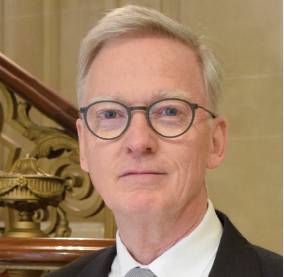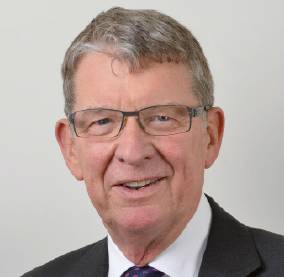Message from RAeS
Message from RAeS
 Thanks to the dedication and perseverance of the organising committee in close co-operation with the executive team in these challenging times, we were able to ensure that my presidential mandate kicked off with the 2021 President’s Conference, entitled ‘UK in the 2020’s – An Emerging Space Power’, a virtual event held on 19 and 20 May, and which turned out to be a great success.
Thanks to the dedication and perseverance of the organising committee in close co-operation with the executive team in these challenging times, we were able to ensure that my presidential mandate kicked off with the 2021 President’s Conference, entitled ‘UK in the 2020’s – An Emerging Space Power’, a virtual event held on 19 and 20 May, and which turned out to be a great success.
Day 1 focused on international partnerships and growth, in which space leaders from NASA and the US, the China National Space Administration, the German Aerospace Center, the UK, Canada, the Australian Space Agency, New Zealand and Japan provided their views on what a 2030 space-enabled world would look like and the opportunities for growth and collaboration, concluding with a panel discussion on the international trading and business ecosystem.
Day 2 focused on UK domestic ambitions, technology, UK regional clusters, and last but by no means least, UK skills, education and apprenticeships.
We were honoured to have a very high level of keynote speakers, including the Rt Hon Amanda Solloway MP, Minister for Science, Research and Innovation, Dr Graham Turnock, UK Space Agency CEO, Dr Josef Aschbacher, Director General of ESA, AVM Harv Smyth, Director Space, UK Ministry of Defence, Her Excellency Sarah Al-Amiri, Chair of the UAE Space Agency, Dr Anna Hogg, Associate Professor of the University of Leeds, as well as Will Whitehorn, President of the space industry body UKspace, who set the scene at the start of Day 1.
None of this would have been possible without the generosity of our lead sponsor, Telespazio and the five additional sponsors, the dedication of the speakers, the session and panel chairs and those who supported them and the online service provider.
At the June Council meeting we started off by welcoming our three newly elected members and our three re-elected members, noting that for the first time in the history of the Society, we have an equal number of elected male and female Council members. The business of Council then proceeded with the secure online election of Dr Alisdair Wood as a Council appointee to the Board of Trustees and the approval of Nominations Committee recommendation for the continued council co-opted posts of Sir Christopher Harper and Nick Shave and one new person, Paul Cremin of the DfT.
As is now the case at Council meetings, members had the opportunity to discuss and express their views on technical, political or academic matters of interest to the Society. In this case related to space, in three specific areas, firstly regarding Human Space Travel, both private and publicly funded and the related ethical aspects, then, regarding Aviation and Space, the potential synergies between the future of both, the exchange of lessons learned in each domain, and most important for the future, the opportunities for greater cohesion across skills and education. Owing to a lack of time, the last topic, Defence and Space, particularly multi-domain operations was not elaborated in depth. The overall discussion was very fruitful, bringing up many interesting views. One question in particular stood out, namely what must the Society do both as a learned society and as a professional engineering institution to enhance our profile and relevance in the space sector, not least in promoting the career opportunities to young people.
I then went on to outline the major objectives for my mandate as President. I will be working with the Branches Committee and the Specialist Group Co-ordination Committee in collaboration with the D&I Committee, the Women in Aerospace and Aviation Committee and the Young Persons Committee to elaborate a plan for every Specialist Group, Division and Branch to nominate one person responsible for Diversity and Inclusion and another person responsible for Young Persons, each engaging with the respective local industries and universities to achieve the Society aim to continue the drive to engage with people from diverse cultures, to encourage and support women and people from other under-represented communities to enter and stay in our world and to encourage young people to consider careers in the sector, be it aerospace, aviation or space.
Last but not least, I was very pleased to have been able to virtually attend the Leslie Bedford named lecture on 1 June organised by the Stevenage Branch and to offer a vote of thanks to the invited speaker, ACM Mike Wigston, Chief of the Air Staff. I have to say that I was most impressed, not only by the very interesting talk and the speaker’s candid responses to the questions raised, but also to the quality of both the event and the selected online system. I look forward to participating, virtually for the time being, at several other named lectures and selected priority events organised by yourselves, our dedicated members.
As I write, I understand that G7 leaders have all pledged support for ‘the safe and sustainable use of space to support humanity’s ambitions now and in the future’ and to take action to tackle the growing hazard of space debris as Earth orbits become increasingly crowded and dangerous. They are calling for implementation of the United Nations’ Long-Term Sustainability Guidelines, a voluntary set of guidelines adopted in 2019, encouraging collaboration through groups such as the United Nations’ Committee on the Peaceful Uses of Outer Space, the International Organization for Standardization and the Inter-Agency Space Debris Coordination Committee, to preserve the space environment for future generations.
